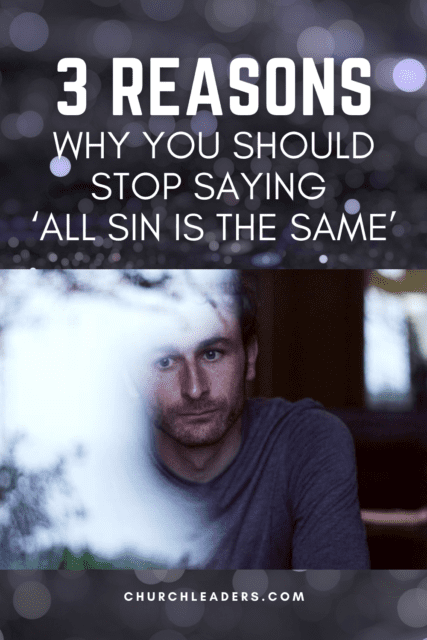Are all sins equal? Over the years as a Christian, I have continually heard different clichés repeated. Some appear on bumper stickers while others reappear in perpetuity on social media. One such falsehood that continues to be passed on from generation to generation is the idea that all sin is equal or all sin is the same.
All Sin Is Equal?
Not only is this a bad idea, it’s a very dangerous teaching. Consider the following three reasons why you should stop saying all sin is the same.
1. All Sin Is Equal? All Sin Is Not the Same According to Biblical Teaching
The absolute best method of testing a theology or a popular catch phrase is by Scripture. If any teaching will stand the intense scrutiny of Scripture, it proves itself to be a trustworthy doctrine. This is true on all matters of theology—from bumper stickers to historic creeds and confessions. The question that we must be asking ourselves as we build our positions is, “What does the Bible say?”
When it comes to sin, the Bible is crystal clear. Sin is an offense to God’s holy law. Any action that misses the perfect bullseye of God’s holy law is a sin—no matter if it hits within a millimeter of the bullseye or 50 yards from the target. Any deviation from perfection is a sin. At this point, many people make false assumptions concerning sin. They make wrong theological statements such as, “Well, all sin is the same.” What does Jesus say about this subject?
In Matthew 10:5-15, we see Jesus sending out the 12 apostles to preach the gospel from town to town. Jesus warns them that not everyone will receive their message. Jesus then made this definitive statement, “And if anyone will not receive you or listen to your words, shake off the dust from your feet when you leave that house or town. Truly, I say to you, it will be more bearable on the day of judgment for the land of Sodom and Gomorrah than for that town” (Matt. 10:14-15). Notice the choice of vocabulary Jesus employed. Jesus never misuses words or throws around vocabulary without a specific intention. He said that those cities who heard the gospel and rejected the message would receive a more intense judgment than Sodom and Gomorrah.
In a similar way, Jesus makes a statement about unrepentant cities who heard and rejected the truth of the gospel. Jesus said, “Then he began to denounce the cities where most of his mighty works had been done, because they did not repent” (Matt. 11:20). Jesus went on to call out Capernaum specifically. He said:
And you, Capernaum, will you be exalted to heaven? You will be brought down to Hades. For if the mighty works done in you had been done in Sodom, it would have remained until this day. But I tell you that it will be more tolerable on the day of judgment for the land of Sodom than for you” (Matt. 11:23-24).
In other words, the central cities surrounding Jesus’ hub of earthly ministry had more light and heard more gospel than any other region on planet earth during Jesus’ preaching ministry. Yet, as John the apostle recorded, “The true light, which gives light to everyone, was coming into the world. He was in the world, and the world was made through him, yet the world did not know him. He came to his own, and his own people did not receive him” (John 1:9-11).
Jesus makes it clear that people who have heard the gospel and rejected it will be held to a higher and more severe judgment than those who have never heard the gospel at all. God judges with perfection, and not all sin is equal.
2. All Sin Is Equal? All Sin Is Not the Same in Its Effect
Suppose you’re standing on the side of a mountain lake in the early hours of the a beautiful fall morning. As you watch the sun rising over the hills, your eyes behold the stillness of the water that serves as a mirror to the brilliant foalage surrounding the edge of the lake. If you toss a rock the size of a quarter into the sill water, it will have a certain effect. A number of ripples will disrupt the stillness of the water. However, if you decided to toss a rock the size of a softball into the water, a much different result would occur. The same thing can be said regarding sin.
When a person murders another human being who is created in the image and likeness of God, it will have vastly different effects than the person who chooses to lie about their taxes in April. Both are undoubtedly sinful, and both deserve the holy judgment of God. However, both sins will leave different ripple effects in their wake. So, really, are all sins equal? Not all sin is the same in the effects that follow the decision to violate the perfect law of God.













